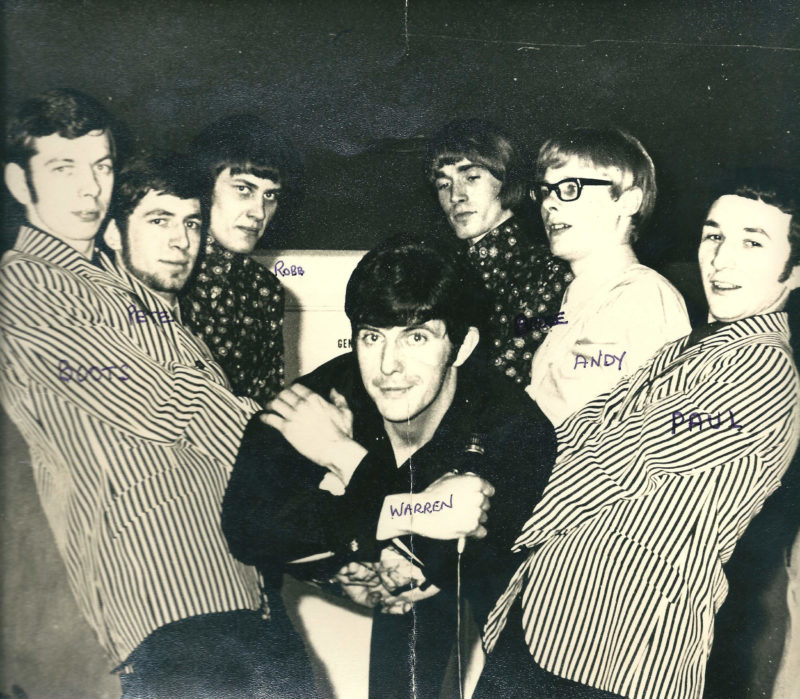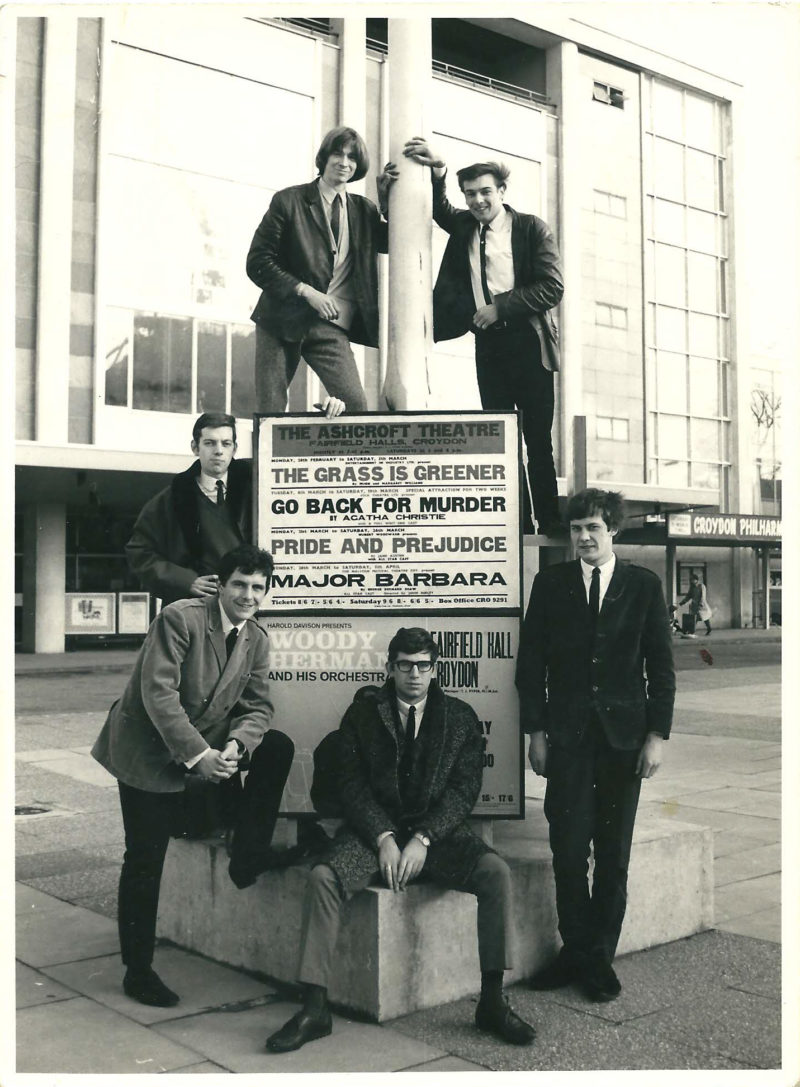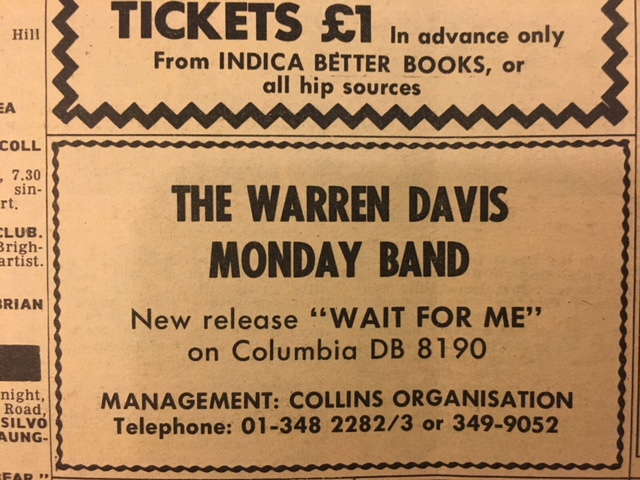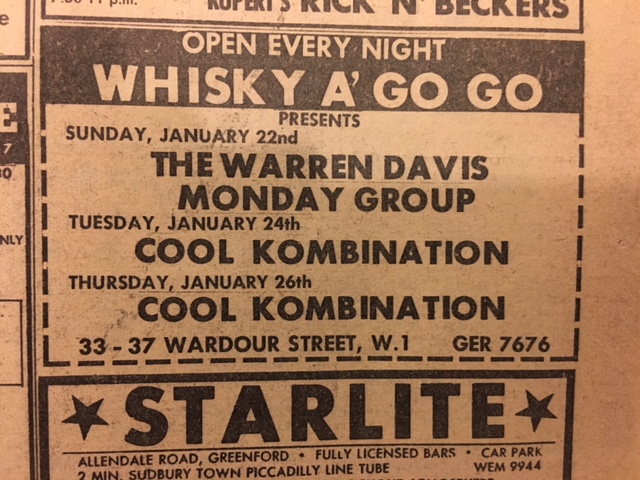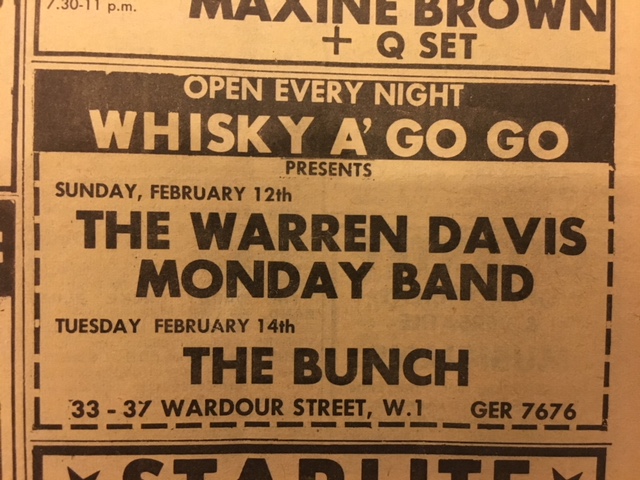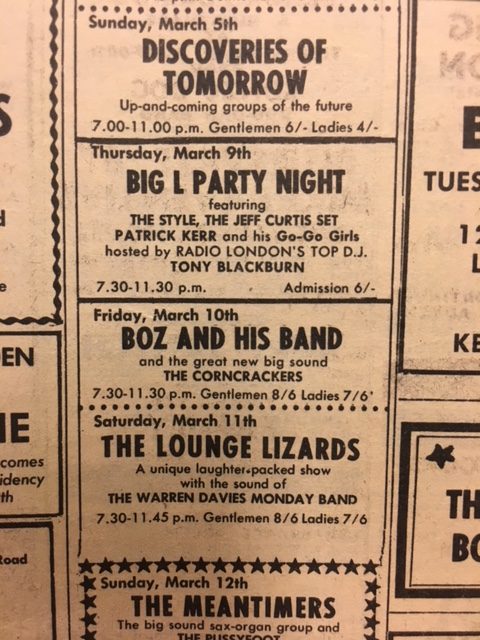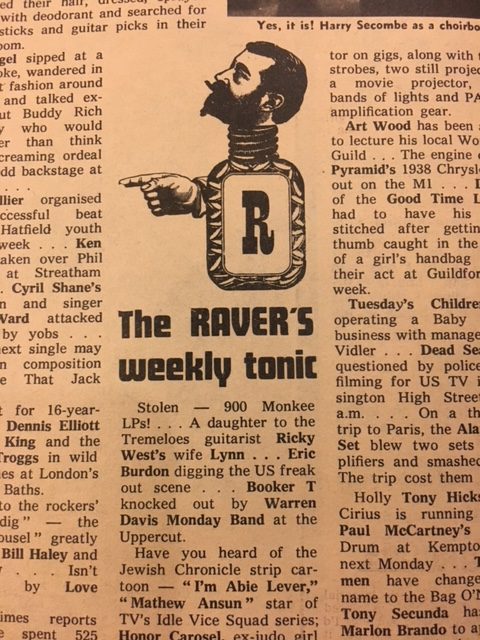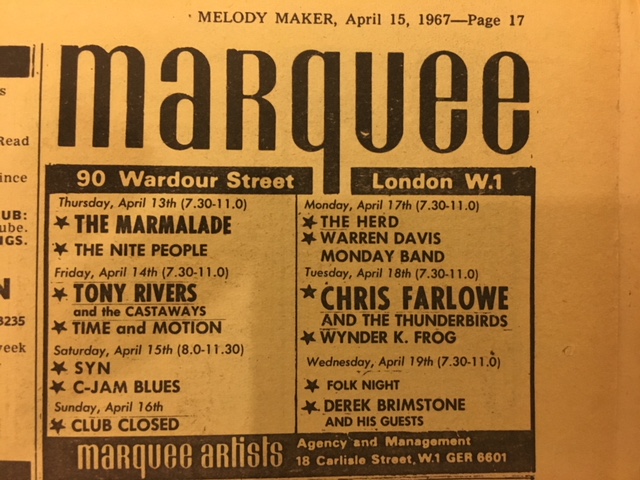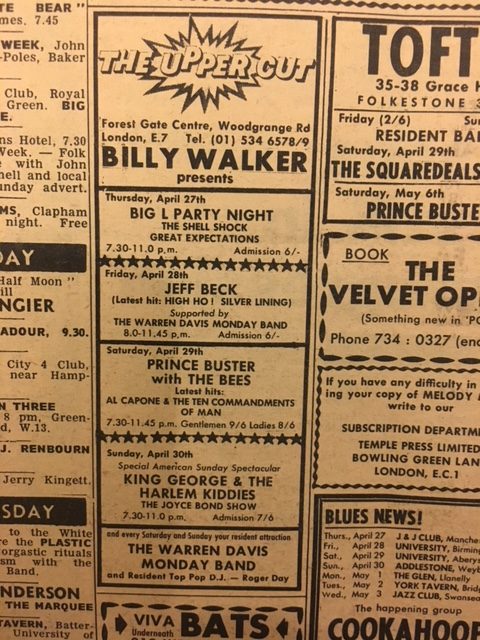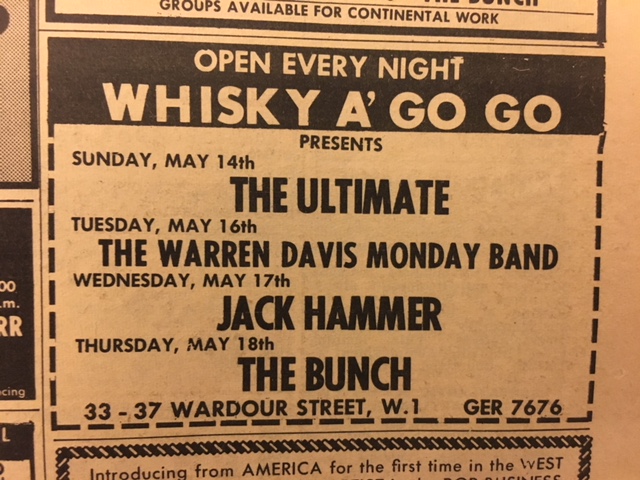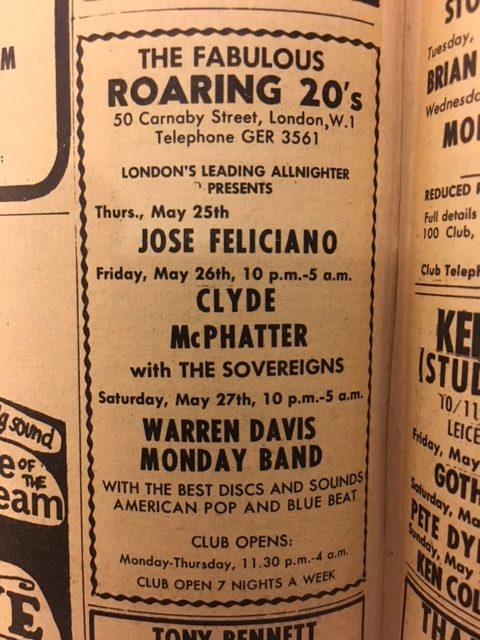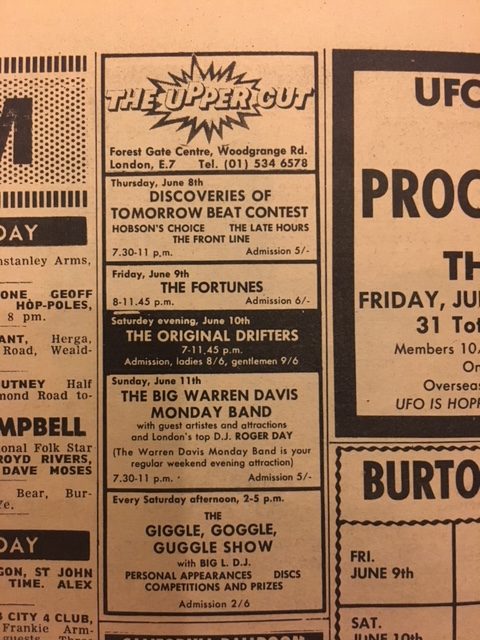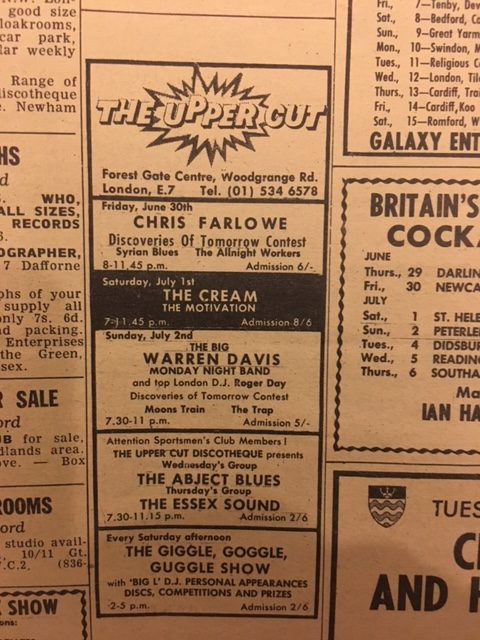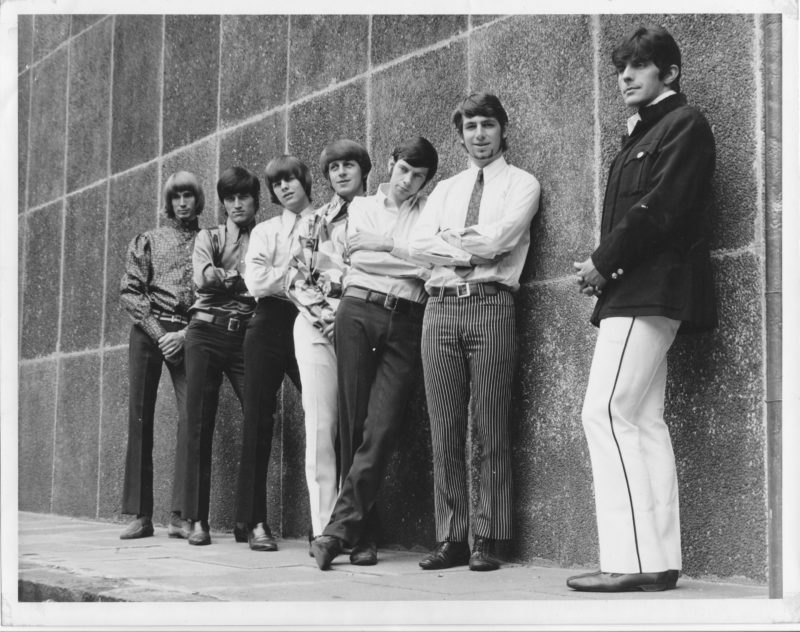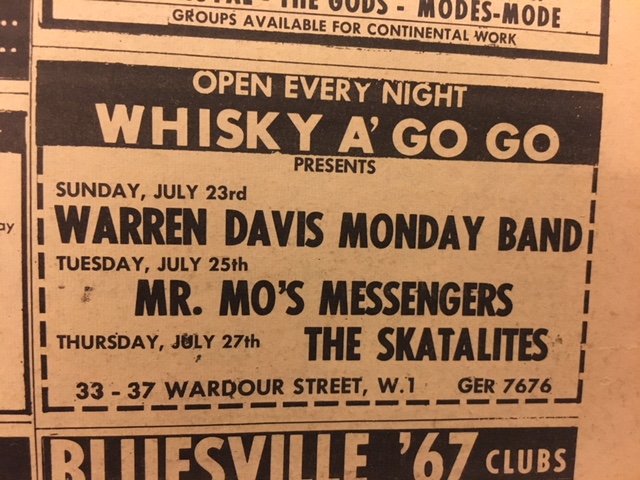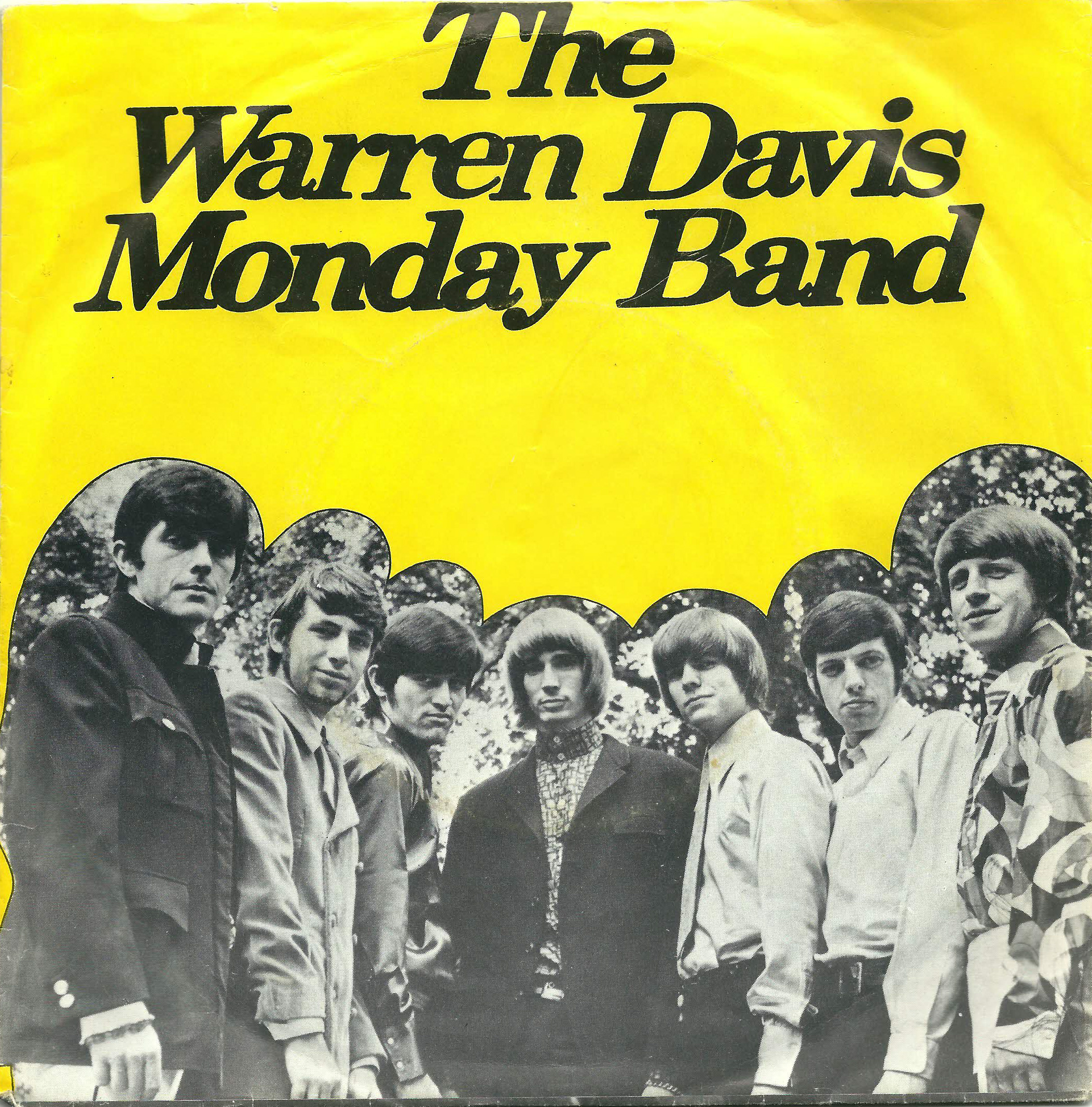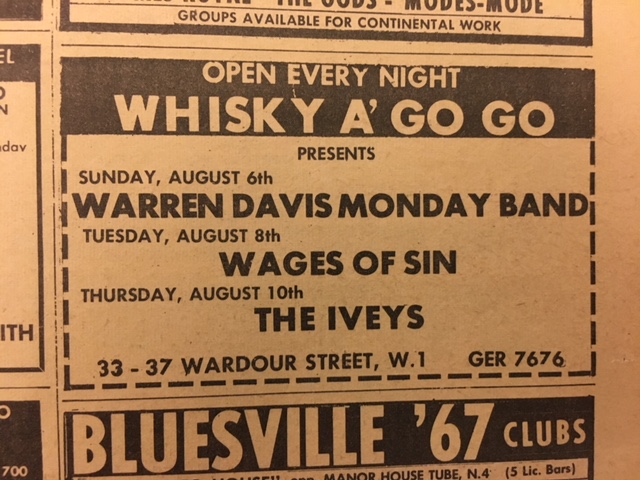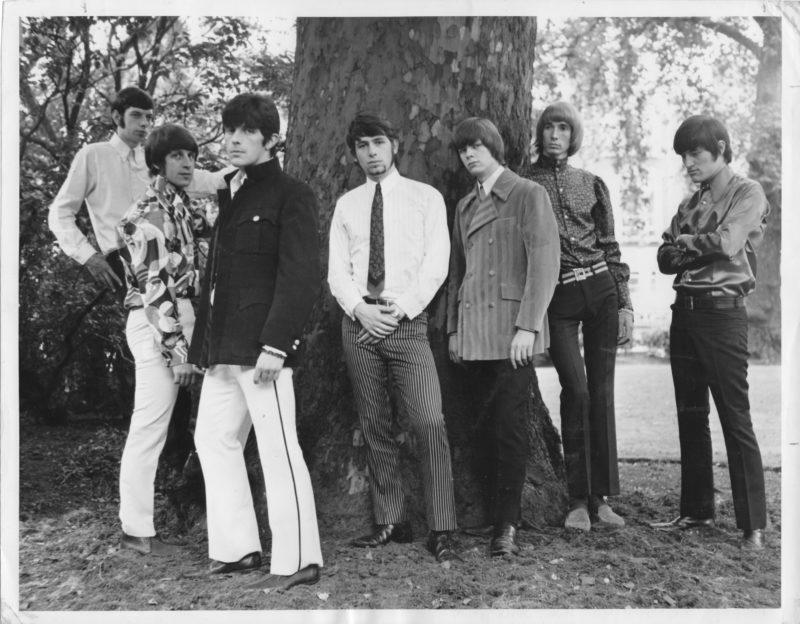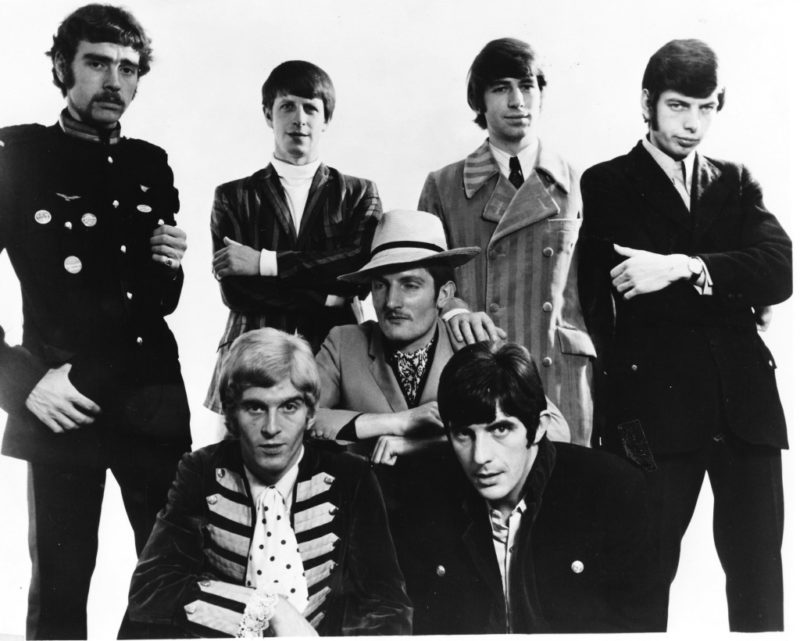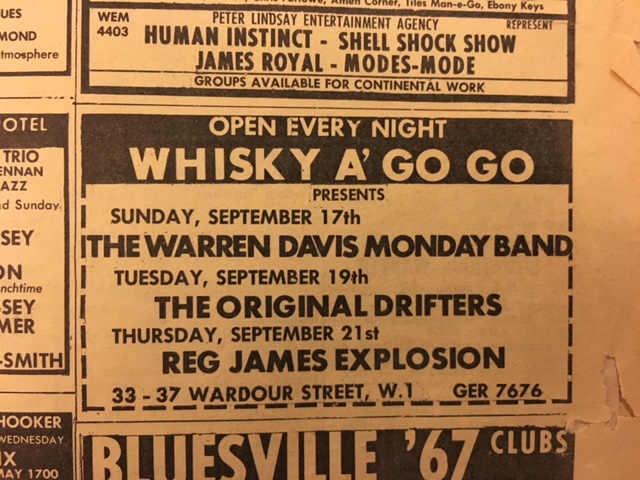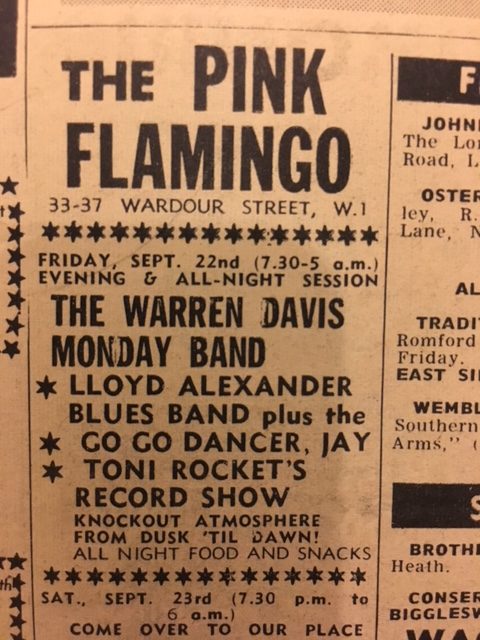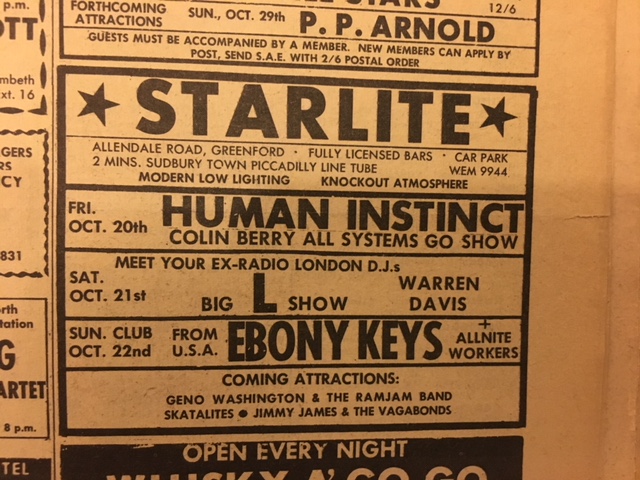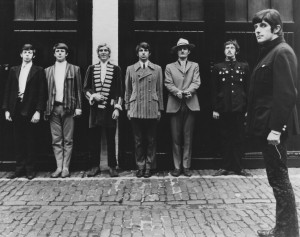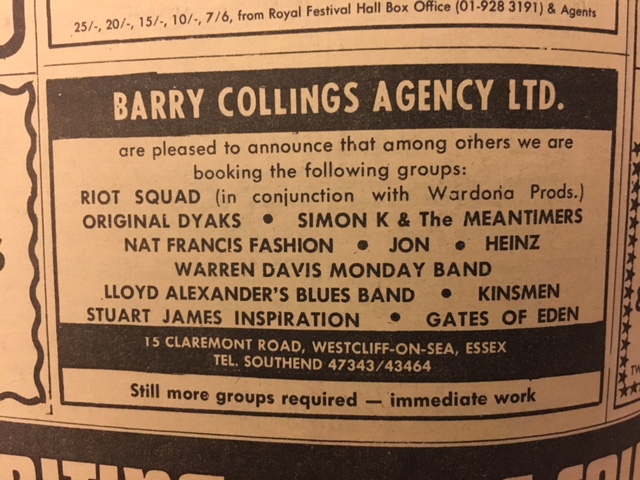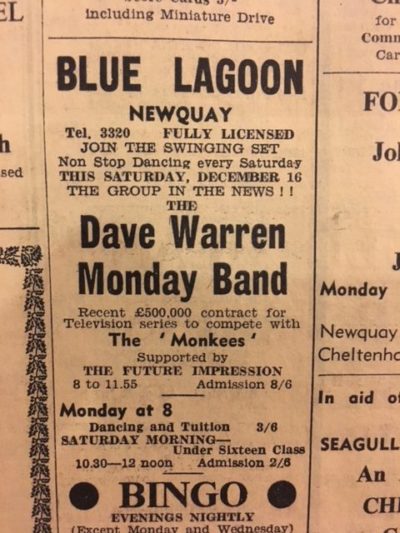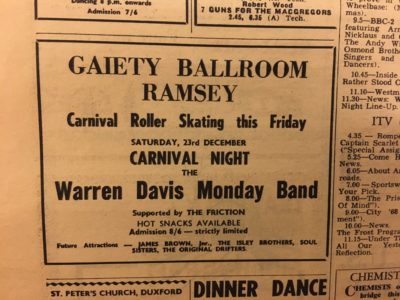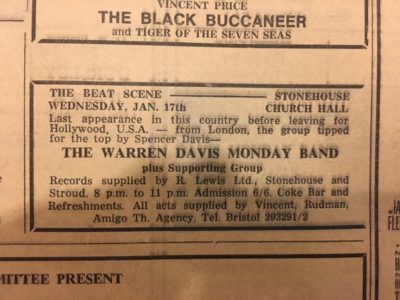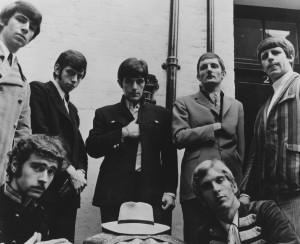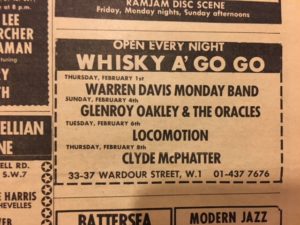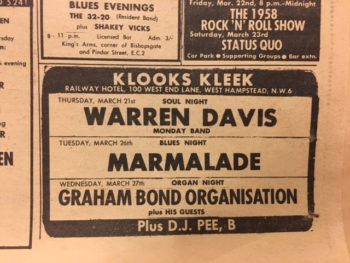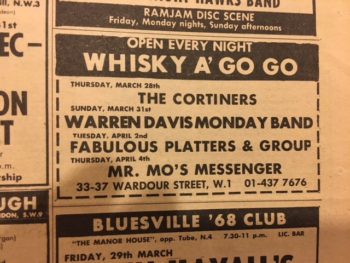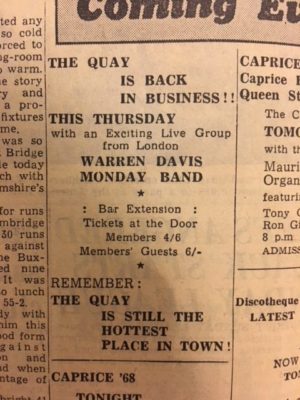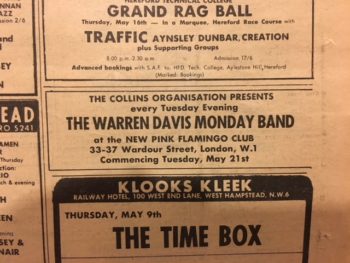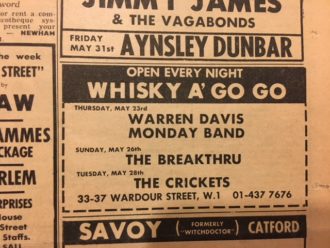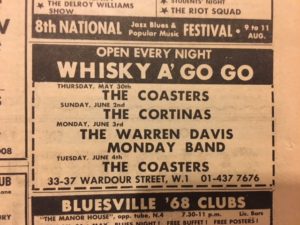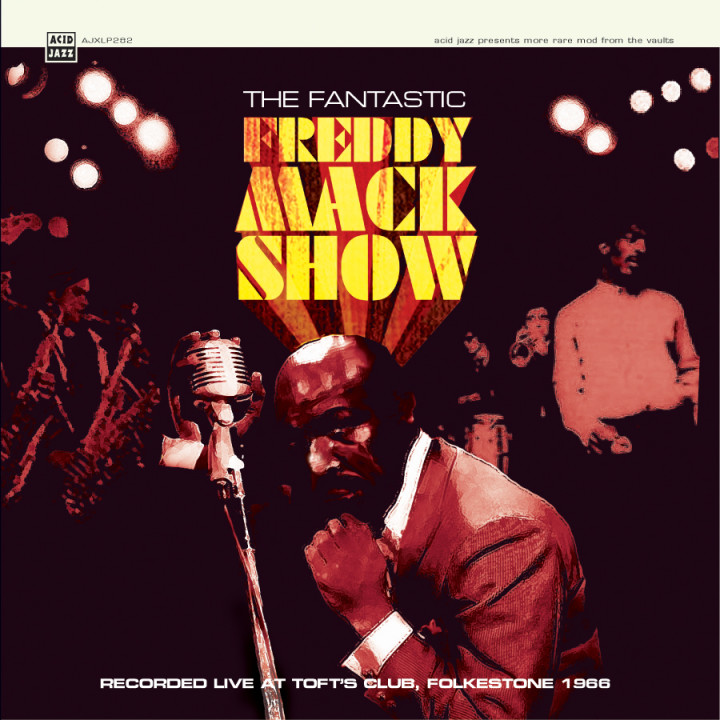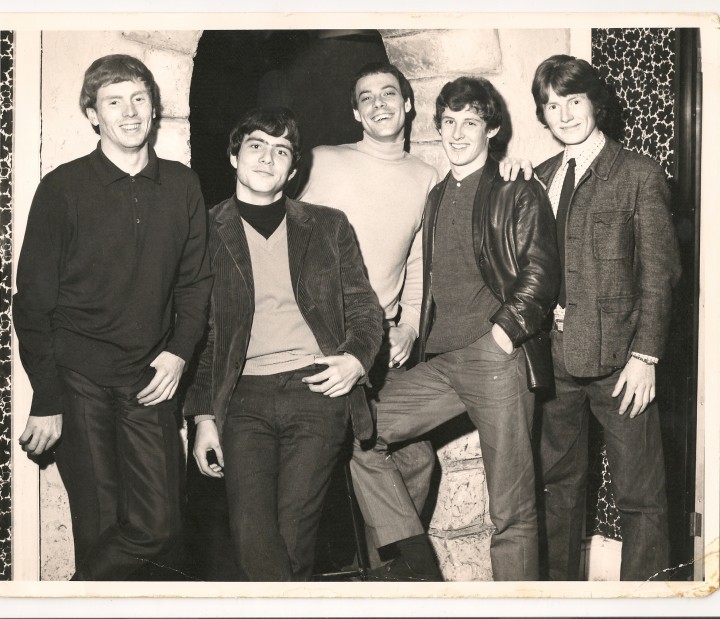
Best known for containing future Jethro Tull guitarist Martin Barre (b. 17 November 1946, King’s Heath, Birmingham), London-based Mod/soul outfit Motivation began life as The Noblemen, changing name in November 1966.
The Noblemen (see earlier entry) originally hailed from Bognor Regis on England’s south coast and contained bass player and band leader Bryan Stevens (b. 13 November 1941, Lha Datu, North Borneo) and keyboard player Mick Ketley (b. 1 October 1947, Balham, south London).
Both musicians had previously played with local band Johnny Devlin & The Detours, who had linked up with South African singer Beau Brummell in late 1964 and become his support group, The Noblemen.
By June 1966, however, The Noblemen’s final line-up had returned to England after touring in Europe.
With drummer Bernie Smith opting out, Stevens, Ketley and guitarist Chuck Fryers had decided to form a new version and brought in two Londoners – singer Jimmy Marsh (b. 9 April 1941, Salem, Carmarthenshire, Wales; d. 13 April 2020) and drummer Malcolm Tomlinson (b. 16 June 1946, Isleworth, Middlesex; d. 2 April 2016).
They then advertised for a horn player in Melody Maker, which resulted in two musicians from the West Midlands auditioning – sax player Chris Rodger (b. 16 October 1946, Solihull, Warwickshire) and his friend Martin Barre, who joined, initially, as a second sax player.
However, when Fryers decided to leave in August to join The Warren J Five and later The Sorrows, Barre assumed lead guitar duties and The Noblemen moved up to London. Signing up with the Roy Tempest Agency, The Noblemen backed soul acts like The Vibrations, Edwin Starr and Alvin Robinson over the next few months.
Throughout 1965 and 1966, a south London R&B outfit from Norbury had been gigging as The Motivation but by the end of the year this band split up, leaving the name free.

With The Noblemen finishing up with work with Roy Tempest and increasingly lining up gigs under their own name, the decision was made to adopt a new moniker and Motivation was chosen (although promoters would sometimes bill them as The Motivation).
That November, The Noblemen were in the middle of supporting US soul act, The Coasters and one of the first gigs using Motivation took place at the Oasis in Manchester on Saturday, 12 November.

The new name remained for a double-nighter a fortnight later, on Saturday, 26 November at the Starlight Ballroom at the Boston Gliderdrome followed by the Burlesque in Leicester.

It was while backing The Coasters that Mick Ketley and Malcolm Tomlinson were invited to a party one evening by the singers to meet an American guitarist friend of theirs who’d recently arrived in London.
“I always thought we were backing The Coasters when one Saturday afternoon we played at an American Embassy type gig along the Cromwell Road then drove to Boston in Lincolnshire where the Move were on stage smashing up TV sets, then on to Leicester for an all-nighter,” says Stevens.
“On the journey back to London Cornell Gunter invited us to a party they were having at the Royal Lancaster on the Sunday evening and said we had to come and meet the most amazing guitarist who had just arrived in the country which turned out to be Jimi Hendrix.”
Stevens also remembers one particularly hair raising story while touring with The Coasters that took place on Sunday, 20 November in Greater Manchester.
“We were backing [them] on a seven-day tour of England and had a double-nighter in Manchester – two large working men’s clubs. It was the Princess and the Domino clubs, owned by the same promoter,” recalls the bass player.
“We went on the first venue and went down very well, in fact there were encores and it made us late leaving. Then we had to pack up the drums and amplifiers and follow the promoter’s car on a dash to the other club the other side of Manchester.”
Arriving nearly an hour late, the group set up its amps behind the stage curtain where it could hear the drunken crowd starting to get rowdy. With no time to waste the club’s manager said: “just bring The Coasters straight on, there’s no time for your lead singer to do even one number”.
The curtain was raised to a huge cheer and The Coasters were hurried on stage. The trouble started immediately. Unfortunately, the one number was not enough to quieten the audience, and when the lead singer Cornell Gunter politely asked the drunken crowd to quieten down, most took no notice and continued to shout out.
After a very loud expletive over the mic Gunter turned his back on the audience and walked back to the waiting band to start the next number. This was met with a torrent of boos, shouting, glass ashtrays and beer bottles. The place went into uproar and the manager shouted from the wings “play them off” and the curtains were closed. All four singers were in a headlong retreat to the dressing room, while the band, minus Jimmy Marsh packed up the gear and loaded the band wagon at the back door from the stage.
“The Coasters were being driven around the gigs by Chris Rodger and when it was time to leave he went to their dressing room where he found them checking their guns for ammunition – by this time some of the crowd were trying to force their way into the dressing room – they were pretty scared like we were,” remembers Ketley.
“While we were loading the gear, we heard screams and shouting coming from the back of the club. Looking through the curtains to our horror Marsh stood, smashed bottle in hand surrounded by five bouncers from the club. He was eventually bundled out the back door and into the band wagon. The police had been called by the manager and eventually we had a police escort out of Manchester, with Rodger driving The Coasters separately but as he said, ‘with their guns at the ready’. We got to the M6 with no further incident and everybody feeling very relieved.”

Jimmy Marsh adds that there is more to the story. “We got to the club and all the bouncers looked like Teddy Boys. They were nasty. One of the bouncers wanted to know what we were going to do. I chimed in and said, ‘Well, I’m the lead vocalist and I usually do half an hour before The Coasters come on’.
“The manager of the club had joined us by that time and said, ‘There’s only time for one song’ and my back went up. I always remember saying, ‘Well, fuck you, I’m not singing, and I headed off for the bar, so they’d have to bring The Coasters on straight away.”
It turned out that’s what the manager wanted anyway as the audience were becoming more and more hostile waiting for the show to start. Perched at the bar, Marsh remembers the beer bottles being thrown at the stage.
“The lead vocalist was so camp, it was outrageous and of course up there a man’s got to be a man,” he says.
“Then one of the bouncers came over to me and said, ‘We’re going to have you’. Well, I hadn’t done anything so I told him to f-off. Anyway, I finished my drink and headed for the stage door and several of them came up behind me and threw me through the door.”
Marsh remembers losing it completely and taking on about five or six bouncers.
“Finally, we got out and, nervous reaction, I’m sitting there in our converted ambulance laughing hysterically. Bryan said to me, ‘You’re mad’ and I said, ‘Well they started it’ and they did.”
As the singer points out, Roy Tempest later presented them with a bill for £30 to cover the damage! Perhaps not surprisingly, the musicians parted with the promoter a few weeks later and in early December 1966 began gigging independently.

A fresh batch of publicity photos were taken in London at Park Lane near Hyde Park and on Bognor Regis train station to mark the occasion.

During this period, Jimmy Marsh remembers [The] Motivation opening for The Tremeloes at Carlisle Town Hall.

Judging by newspaper adverts, [The] Motivation continued to gig across England in the lead up to Christmas, including performances at the Hotel Leofric in Coventry (not far from Barre’s home Solihull) on Sunday, 4 December; the Gala Ballroom in Norwich on Saturday, 10 December (billed as The Motivations); the Britannia Rowing Club in Nottingham on Saturday, 17 December; and the Concorde in Southampton on Tuesday, 20 December.

To add to the confusion, another group called The Motivation from Cheshire (sometimes billed as The Motovation) began gigging from late 1966 into late 1967.
Some of the northern gigs therefore may have been by this band, although the show at the Lion Hotel in Warrington, Cheshire on Saturday, 24 December was not one of them.

Judging by a gig in The Kentish Express, the band appears to have seen the year out with a gig at the ‘2 ‘B’s’ Club in Ashford, Kent with The Suspects, a venue they had previously played as The Noblemen on 29 August 1966.
Bryan Stevens kept a gig list of Motivation’s shows in January, February and early March, which reveal that the opening months of 1967 were no less frenetic on the touring front.

Appearances included the Winter Gardens in Penzance and the Blue Lagoon in Newquay, both in Cornwall on Friday, 6 and Saturday, 7 January respectively; a return to the New Yorker Discotheque in Swindon on Saturday, 14 January; the Bromel Club in Bromley, south London on Friday, 20 January; the Royal Links Pavilion in Cromer, Norfolk on Saturday, 22 January; and a return to the Concorde in Southampton on Tuesday, 24 January.

Of significant note are two dates at the legendary Marquee club in Wardour Street where they were billed to open for The Herd (featuring Peter Frampton) on both occasions.
The first took place on Monday, 6 February, followed by a second appearance the next month on Monday, 6 March.

On the second occasion, Marsh remembers surprising his band mates by announcing that he wanted to sing a Roy Orbison classic, “Running Scared” among the usual soul numbers. At first the band refused to play it but relented when he threatened to walk off the stage. Marsh notes that the song brought the roof down.

Stevens’ gig list reveals that February and early March were also packed with dates. These included the Carlton Ballroom in Erdington, West Midlands (later to become Mothers) on Friday, 10 February; RAF Benson in Oxfordshire on Thursday, 16 February; an Oxford College on Saturday, 25 February; and Tiles on Oxford Street on Saturday, 4 March.

One date stands out: Cooks Ferry Inn in Edmonton in north London on Friday, 17 February as the other act on the bill was none other than The John Evan Smash (later to morph into Jethro Tull!).

Newspaper adverts reveal quite a few missing dates from Stevens’ list so it’s not clear if these gigs took place or were by another version of The Motivation but they include venues that Barre’s group performed at.

These include the Kingfisher Hall in Redditch, Worcestershire on Friday, 3 February; Maidstone Corn Exchange the next day (4 February); and the Royal Ballrooms in Boscombe, Bournemouth, Dorset, which was a venue the band played extensively, on Wednesday, 1 March.
The Maidstone gig above does seem likely because on the same day, Motivation returned to the ‘2 ‘B’s’ Club in Ashford, Kent, which is listed on Bryan’s gig list for sometime in late January-early February.

Whatever the case, sometime around the second Marquee date with The Herd in early March, Motivation got a new set of publicity photos taken on the banks of the River Thames near Syon Park in west London.

Then, later that week on 8 March, the musicians headed off for Rome to perform at the famous Piper Club for around four weeks, playing six hours a night until 3am.
Chris Rodger remembers Motivation started playing on Saturday, 11 March, having driven non-stop for 60 hours to the Italian capital.
Jimmy Marsh vividly recalls Ray Charles’s dancers came in while they were there and asked the band to prolong their solo so they could dance to the music. The singer promptly leapt off the stage to dance with them!
More significantly, Marsh also remembers that The Rolling Stones’ entourage came into the club while they were resident band.
“I vaguely remember when The Rolling Stones’ ‘fixer’ Tom Keylock came to the Piper Club,” says Stevens.
“He invited some of our guys to his table and praised our set. He said he’d try and fix our band to be a warm up for The Rolling Stones when they played later that month in Italy but nothing happened.
“There were a lot of celebrities turning up at the Piper Club. One of The Beatles’ parents invited some of our guys to their table. I think it was George Harrison’s parents.”
The Rolling Stones did, in fact, play in Rome on Thursday, 6 April, so it seems likely the group was still performing at the Piper Club at this point.
“I know that we played for a few weeks at the Piper Club and then a week or two at a very small but smart nightclub, also in Rome,” says Martin Barre.
“After that we had no work but had met a really nice young man [Marco] with his fiancé while at this nightclub and he invited us to play at his club in Livorno.”
Ketley recalls that the ‘smart club’ in Rome was a bitter sweet experience.
“The owner was a friend of the owner of the Piper club Senor Boniga. Looking back, I think he got money from the owner of the dining club. It was a smart dinner club and all they wanted was very quiet dinner music. We were constantly told to ‘turn down’ and our music was not really suitable.”

Behind the scenes, however, the pressures of being on the road began to take its toll. “When we were in Rome I had to attend the hospital,” recalls Marsh.
“I punctured my vocal chords and to get it fixed, you would have to be a big time operator to foot that kind of bill.”
With his health failing, Marsh left the band in Rome and returned to England.
Jimmy Marsh subsequently dropped out of the music business, only resurfacing briefly in the early ’80s with the short-lived west London band, A Touch of Gold.
Looking back, he has this to say. “A big problem with Motivation was the rivalry. Martin [Barre] was my favourite; he was a lovely kid. I always thought good luck to him when he made it.”
He also remembers a story regarding the future Jethro Tull guitarist. “After I left them I was living in Notting Hill Gate in Pembridge Villas and Martin turned up at my place. I always remember the girl who lived in the room next to me had a lovely clarinet, which she was going to sell and he wanted it but didn’t have the money. I said, ‘Martin, do you want me to get it for you?’ He said, ‘No, thanks’. Next thing I know he’s worth millions!”
This author was in contact with the singer a few years ago but recently found out that he died on 13 April 2020.

With Jimmy Marsh out of the picture, Martin Barre remembers Mike Ketley took over all the lead vocals for the remainder of the Italian dates.
“Jimmy didn’t come to the club in Livorno,” says the guitarist. “We stayed at this guy’s fiancé’s house. At first we slept in the attic but it was so hot that we moved to a nearby hotel. This became too expensive and we had to finish in Livorno and drive home.
“While in Livorno we went to the Viareggio Piper Club and saw Dave Antony’s Moods, a band I had seen before with The Moonrakers at the Bure Club near Bournemouth.”
Chris Rodger, who wrote letters to his future wife while he was away in Rome, notes that the band arrived back in England on 19 May and took a week’s holiday to recover.

Motivation were billed to play at the New Yorker Discotheque on Saturday, 15 April and the advertisement also notes that they recently played at the Cromwellian in west Kensington. However, neither gig was honoured as the band was still in Italy.
The same is true of other gigs advertised during April and May. These include the Methodist Hall in Studley, Warwickshire on Saturday, 22 April and a show the following day at the Tavern Club in Dereham, Norfolk.
Rodger does remember his final gig with the band, which took place at the Playboy Club on Park Lane, central London on 27 May, after which he announced his departure.
Soon afterwards, the musicians went in search of a new lead singer to take over from Jimmy Marsh.
Singer Denny Thomas Alexander (b. 10 March 1946, Liverpool, Lancashire, d. 6 December 2018) remembers Stevens picking him up from his home in Liverpool and then collecting Martin Barre in Solihull on route to Bognor Regis where the new version would rehearse extensively at the Shoreline Club.
Stevens and Ketley had remembered The Clayton Squares’s singer whose band had shared the stage with Beau Brummell & The Noblemen at the Storyville Club in Frankfurt in West Germany back in March 1966.
“When we decided we wanted a change after Jimmy Marsh, I contacted Denny who agreed to join up with us,” remembers Stevens.
“I went up to Liverpool and brought him down to Bognor where he stayed at the Shoreline Hotel (the only teenage hotel run by teenagers for teenagers in Bognor) while we got a new act together before going out on the road again.”
Alexander, like his erstwhile colleagues, had been active since the early ’60s, playing with Liverpool bands Tony & The Chequers, The Aarons, The Secrets and The Kinsleys.

His greatest success, however, came with The Clayton Squares, who he joined in February 1965 and with whom he recorded two singles for Decca in late 1965 and early 1966. The band, which was managed by Don Arden, had played extensively at the Cavern but had arrived on the scene too late to capitalise on the success of the first wave of Merseyside bands.
Alexander, who had been working in West Germany with the London-based group, The Thoughts (and recorded unreleased material with them for Shel Talmy’s Planet Records) after leaving the Clayton Squares, brought both a strong voice and some powerful original material to the new Motivation line up.
It’s quite possible that most of June 1967 was spent rehearsing new exciting original material that Alexander was starting to pen and performing it at the Shoreline (dates for this venue are impossible to find).
During this period back on the south coast, Motivation was booked to appear at the Royal Ballrooms in Boscombe on Tuesday, 28 June, returning soon after to perform on Monday, 3 July.

More significantly, on Saturday, 1 July, Motivation opened for Cream at the Upper Cut in Forest Gate, east London.
Ketley remembers finishing their set and walking outside for fresh air and heard a strange noise coming from an open back truck parked next to their own gig wagon.
“I couldn’t believe my eyes as there laid down in the back of the truck was Ginger Baker opening up packets of drum sticks and rolling them across the floor of the truck so he could choose the best ones for the set. I also remember the drum roll Ginger did on the double bass drums while getting ready to open – the curtains were closed and even then the audience erupted – they opened with ‘Sunshine of Your Love’. Amazing!”

On Friday, 4 August, Motivation also appeared at Caesar’s Place at the Mulberry Tree in Stratford-upon-Avon in Warwickshire with The Agency.
Then, the following day, they travelled to Birmingham to appear at the Carlton Ballroom in Erdington, followed by a second show that evening at the Elbow Room in Aston. The weekend was completed with a show in Coventry on the Sunday at the Casablanca Club in the Sportsman’s Arms, Allesley.

During August, the band (sometimes billed as The Motivations) appeared at the Beeches Barn Theatre in Cirencester, Gloucestershire (Friday, 11 August) before returning to the Royal Ballrooms in Boscombe for a show on Saturday, 19 August and then travelling to Worcestershire to appear at the Chateau Impney in Droitwich on Friday, 25 August. It was at this point that another name change was deemed necessary.

With the Cheshire version of The Motivation increasingly active (they opened for The Jeff Beck Group at Nantwich Civic Hall on 24 June 1967) and yet another group billed as The Motivation signing and later recording with Direction Records, the musicians decided to become The Penny Peep Show.
To be continued…
Thanks to Bryan Stevens, Mike Ketley, Martin Barre, Jimmy Marsh, Denny Alexander, Chris Rodger, Malcolm Tomlinson, Mike Paxman, Vernon Joynson and Hugh MacLean. Thank you to Bryan Stevens and Mike Ketley for the band photos.
Copyright © Nick Warburton. All Rights Reserved. No part of this article may be reproduced or transmitted in any form or by any means, without prior permission from the author.



























































